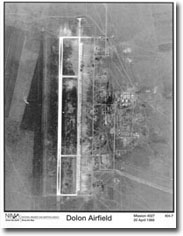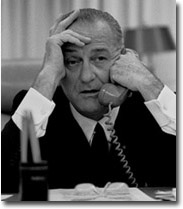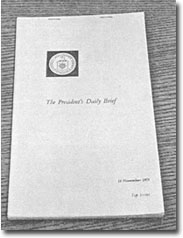 |
| Actual
intelligence method, declassified. |
|
 |
| Actual
deliberative process, declassifed. |
|
 |
Intelligence
method?
Deliberative process?
Still secret. |
|
|
CIA
SECRECY CHALLENGED ON PRESIDENT'S DAILY BRIEF
UC
Davis Professor Appeals Lower Court Decision
Withholding Two 40-Year-Old Memos to LBJ
9th
Circuit to Consider Whether Presidential Privilege is Immortal,
Whether Intelligence Reports Qualify as Intelligence Methods,
and
Whether Content of Documents or Their Letterhead Should Govern
Release
Posted
January 19, 2006
For
more information: Professor Larry Berman 530/752-3076
Thomas R. Burke, Duffy Carolan, Davis Wright Tremaine 415/276-6500
Meredith Fuchs, Thomas Blanton, National Security Archive 202/994-7000
Sacramento, California, 19 January 2006 - A federal
district judge's opinion
last year ordering more secrecy for two almost 40-year-old
CIA memos to President Johnson contradicted Supreme Court precedent
and the plain language of the Freedom of Information Act, as
well as time limits on presidential privilege set in the Presidential
Records Act, according to the
appeal filed yesterday with the U.S. Court of Appeals for
the Ninth Circuit by University of California, Davis professor
Larry Berman.
Represented by Thomas Burke and Duffy Carolan of Davis Wright
Tremaine LLP, and by Meredith Fuchs of the National Security
Archive at George Washington University, Professor Berman sought
declassification review and release of two President's Daily
Briefs prepared by the CIA for President Johnson during the
Vietnam War, one from the day before and one from the day after
two other Briefs that had previously been
declassified by the CIA.
In response, the
CIA argued - and U.S. district judge David Levi upheld CIA's
claims - that, regardless of their age and content, no Briefs
could be released even in part without damage to U.S. national
security and to the presidential privilege of confidential communications
with advisers. During the same month in which Professor Berman
filed his legal complaint, however, the CIA actually declassified
two other LBJ-era Briefs when they appeared in cable format
rather than on President's Daily Brief letterhead.
Judge Levi declined to review the two Briefs at issue in the
case, ignored the millions of pages of declassified and published
CIA intelligence products already available (including 35
other declassified Briefs introduced into the record by
Professor Berman), and ruled that the Briefs are themselves
an "intelligence method" that must be protected. Attorney
Duffy Carolan commented, "Judge Levi's decision offers
no logical distinction between the CIA's secret methods of gathering
intelligence and the intelligence product it prepares for its
customers. It essentially ignores 40 years of FOIA history and
practice."
Judge Levi also ruled that presidential privilege still applies
to the LBJ-era briefs, despite the Supreme Court's finding in
the Nixon tapes cases that privilege erodes over time, and Congress's
clear finding in the 1978 Presidential Records Act that the
privilege no longer applies 12 years after the president leaves
office.
"This case is not about revealing intelligence sources
and methods," remarked Professor Berman, a noted Vietnam
War scholar. "This case is about whether the CIA can declare
its factual briefings to the president, no matter how old and
no matter what they say, off limits to history and to the American
public, forever and without review."
A number of noted scholars of the American Presidency
and the Vietnam War, as well as the nation's leading history and
political science associations, are planning to file an amicus
curiae brief on January 25 in support of Professor Berman's appeal.
Silberman/Robb
Commission Discussions of Current PDB Methods that Contributed
to "intelligence failure" on Iraq
The
Commission on the Intelligence Capabilities of the United States
Regarding Weapons of Mass Destruction, March 31, 2005
Source for the above 1967 PDB excerpts: Lyndon Baines Johnson
Library (Austin, Texas), National Security Council History,
Middle East Crisis, Appendix A, obtained by Dr. William Burr.
President's
Daily Brief, 1 April 1968 (5 pp.), declassified 21 December
1989
Source: Lyndon Baines Johnson Library (Austin,
Texas), National Security File, Intelligence Briefings File,
obtained by Dr. William Burr.
|

